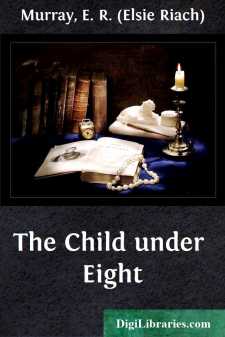Categories
- Antiques & Collectibles 13
- Architecture 36
- Art 48
- Bibles 22
- Biography & Autobiography 813
- Body, Mind & Spirit 142
- Business & Economics 28
- Children's Books 15
- Children's Fiction 12
- Computers 4
- Cooking 94
- Crafts & Hobbies 4
- Drama 346
- Education 46
- Family & Relationships 57
- Fiction 11829
- Games 19
- Gardening 17
- Health & Fitness 34
- History 1377
- House & Home 1
- Humor 147
- Juvenile Fiction 1873
- Juvenile Nonfiction 202
- Language Arts & Disciplines 88
- Law 16
- Literary Collections 686
- Literary Criticism 179
- Mathematics 13
- Medical 41
- Music 40
- Nature 179
- Non-Classifiable 1768
- Performing Arts 7
- Periodicals 1453
- Philosophy 64
- Photography 2
- Poetry 896
- Political Science 203
- Psychology 42
- Reference 154
- Religion 513
- Science 126
- Self-Help 84
- Social Science 81
- Sports & Recreation 34
- Study Aids 3
- Technology & Engineering 59
- Transportation 23
- Travel 463
- True Crime 29
The Child under Eight
Description:
Excerpt
CHAPTER I
"WHAT'S IN A NAME?"
It is an appropriate time to produce a book on English schools for little children, now that Nursery Schools have been specially selected for notice and encouragement by an enlightened Minister for Education. It was Madame Michaelis, who in 1890 originally and most appropriately used the term Nursery School as the English equivalent of a title suggested by Froebel[1] for his new institution, before he invented the word Kindergarten, a title which, literally translated, ran "Institution for the Care of Little Children."
[Footnote 1: Froebel's Letters, trans. Michaelis and Moore, p. 30.]
In England the word Nursery, which implies the idea of nurture, belongs properly to children, though it has been borrowed by the gardener for his young plants. In Germany it was the other way round; Froebel had to invent the term child garden to express his idea of the nurture, as opposed to the repression, of the essential nature of the child. Unfortunately the word Kindergarten while being naturalised in England had two distinct meanings attached to it. Well-to-do people began to send their children to a new institution, a child garden or play school. The children of the people, however, already attended Infant Schools, of which the chief feature was what Mr. Caldwell Cook calls "sit-stillery," and here the word Kindergarten, really equivalent to Nursery School, became identified with certain occupations, childlike in origin it is true, but formalised out of all recognition. How a real Kindergarten strikes a child is illustrated by the recent remark from a little new boy who had been with us for perhaps three mornings. "Shall I go up to the nursery now?" he asked.
The first attempt at a Kindergarten was made in 1837, and by 1848 Germany possessed sixteen. In that eventful year came the revolution in Berlin, which created such high hopes, doomed, alas! to disappointment. "Instead of the rosy dawn of freedom," writes Ebers,[2] himself an old Keilhau boy, "in the State the exercise of a boundless arbitrary power, in the Church dark intolerance." It must have been an easy matter to bring charges of revolutionary doctrines against the man who said so innocently, "But I,вÐâI only wanted to train up free-thinking, independent men."
[Footnote 2: Author of An Egyptian Princess, etc.]
It was from "stony Berlin," as Froebel calls it, that the edict went forth in the name of the Minister of Education entirely prohibiting Kindergartens in Prussia, and the prohibition soon spread. At the present time it seems to us quite fitting that the bitter attack upon Kindergartens should have been launched by Folsung, a schoolmaster, "who began life as an artilleryman." Nor is it less interesting to read that it was under the protection of Von Moltke himself that Oberlin schools were opened to counteract the attractions of the "godless" Kindergarten.
Little wonder that the same man who in 1813 had so gladly taken up arms to resist the invasion of Napoleon, and who had rejoiced with such enthusiasm in the prospect of a free and united Fatherland, should write in 1851:
"Wherefore I have made a firm resolve that if the conditions of German life will not allow room for the development of honest efforts for the good of humanity; if this indifference to all higher things continuesвÐâthen it is my purpose next spring to seek in the land of union and independence a soil where my idea of education may strike deep root."
And to America he might have gone had he lived, but he died three months later, his end hastened by grief at the edict which closed the Kindergartens....


